Our first day in Mexico City had us leave Mexico City for the town of Zumpango, a northern “suburb” of sorts to Mexico City.
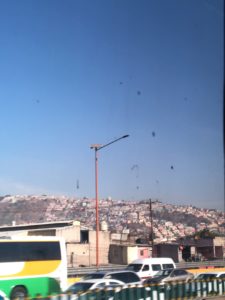
(Just pictures of the northern side of Mexico City on our drive to Zumpagno. Still pretty close to what Zumpagno looked like, but its fascinating to see the houses built right up the hills.)
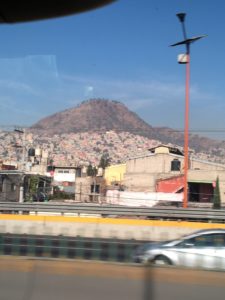
We went to Holy Trinity parish and spent time with the parish community. There was a lot of translating today and one of the guys who has been translating made the observation that these people are sharing their inner lives with us. Spanish as a Romance language to English is hard enough (and I know some Spanish so I know), but he asked: “how do you translate a soul?”
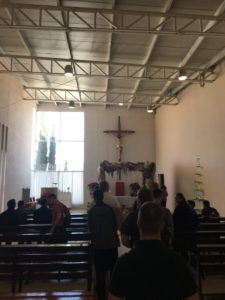
(The church. Very different from the Cathedral, no?)
We had Mass, then Father Floeder led a Q and A dialogue with the people. They were very welcoming to us and Mass was full of life with singing, clapping, and strong devotion. We found that the people here experience many many of the same challenges Catholics in the US have. They spoke of parents having to work and the breakup of their families, the increase of iphones, materialism, secularism, and actually encountering the Lord in their heart. After the talk, we helped them take down their Nativity scene, some helped dig holes for a sacristy expansion, and some of us played tag with some of the kids.
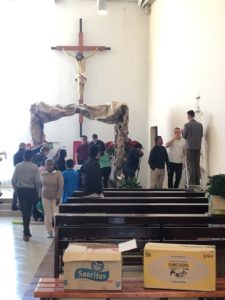
Just saying…running in high altitudes with poor air quality…oofta as they say in Minnesota. It was fun, but in the first five minutes…
After some work, we met with Father Manuel, the local priest who is the only priest covering just about 107,000 people in his parish boundaries. He does 8 Masses on Sunday and covers several smaller chapels around the towns. He is the first priest assigned to this area in 4 years since it is considered a “dangerous zone” with cartels, drugs, and trafficking. The people feel abandoned so Father’s main focus has been to be present and available to the people.
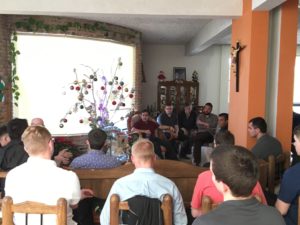
Father was a real inspiration for all of us since he was very grounded in prayer and trust in God in incredibly difficult situations. He said there is a shooting in the neighborhood near the parish every day and many young people get involved with drugs and smoking early. He realizes that the people won’t come to the Church and he can’t wait for them, so he goes to them. The people we met said as much too that “Father is not afraid to get his hands dirty” and “I have met priests of the altar and the office, but never a priest of the people.” He has revitalized evangelization for kids and youth for he found that happy kids lead to happy parents and more involvement in church activities. He has also reached out to the men by having them help do work and he joins them. It helps them open up to the Lord and that they do not need to rely on themselves with false “machismo.” He has also reached out to the drug dealers who told him that he was on their hit list, but they have seen how he is good for the community and have vowed to protect him from those who still want to kill him.
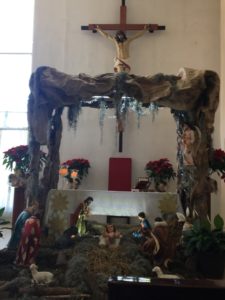
(A close up of the altar and Nativity scene front and center.)
I think we can focus too much on the “shortage of priests” and forget that this is God’s Church. One priest in this area has started a rejuvenation of the parish that no amount of office work or programs can achieve. Thats not to discount programs and necessary office work, but there is something to be said for seeing a priest being a witness. As Cardinal Robert Sarah says in his book The Day is Now Far Spent, “Today, find a priest and thank him for what he is! Not for what he has accomplished, but for what he is: a man radically dedicated to God!” (Page 86)
Imagine what would happen if each one of us lived the relationship we have with Jesus in our lives. This calling is not just for priests and religious, but for all of us today. Why wait? We don’t then need to translate a soul, but we would be encountering souls.
